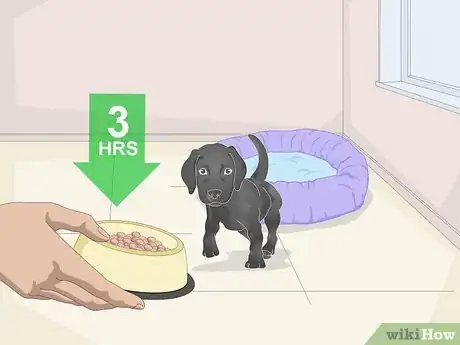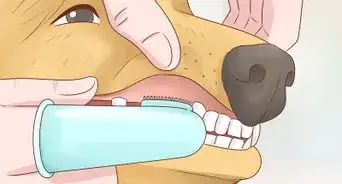This article was co-authored by Elisabeth Weiss. Elisabeth Weiss is a Professional Dog Trainer and owner of Dog Relations NYC, a dog training service in New York, New York. Elisabeth relies on science-based, force-free, and reward-based techniques. Elisabeth offers behavior training, puppy manners, body awareness and injury prevention, diet, exercise and dog nutrition services. Her work has been featured in New York Magazine and on the Dog Save the People podcast. She also trained all the dogs in the movie "Heart of a Dog" by Laurie Anderson that features Elisabeth's journey with Laurie Anderson's and Lou Reed's dog Lolabelle and how her passion for playing the keyboards played a significant role in improving her quality of life after being diagnosed with pancreatic cancer.
This article has been viewed 78,845 times.
Puppies that have trouble sleeping can cause you to lose sleep, as well. Because losing sleep can disrupt your daily life, it is important to figure out how to get your puppy to sleep. Pent up energy may be the cause of your puppy's sleeplessness. Therefore, make sure your puppy gets the necessary amount of physical and mental activity before bedtime. Try to reserve these activities for the evening to ensure that your puppy is sleepy for bedtime. Additionally, to help your puppy sleep through the night, make sure their bed is warm and comfortable. You can also comfort your puppy by placing their crate in your room. Your presence will provide a sense of security that will help them fall asleep better at night.
Steps
Meeting Your Puppy's Basic Needs
-
1Make sure they get plenty of play time. Because puppies are growing, they need at least 17 hours of sleep per day. This means that your puppy will be napping a lot throughout the day. However, you can control when your puppy sleeps by developing a routine. Limit your puppy’s naps to the morning, middle of the day, and the afternoon. Make sure to reserve evenings for play time.[1]
- Make sure your puppy is good and tired for bedtime by stimulating their mind and body with age-appropriate games and toys. For example, take your puppy outside so they can run around, sniff, dig in the yard, and exhaust their pent up energy.
- You can also start teaching your puppy basic commands like "sit" and "come." These physical and mental activities in the evening will ensure that your puppy is ready for bedtime.
-
2Feed your puppy three hours before bedtime. Do not feed your puppy right before bedtime. By feeding them right before bedtime, you are ensuring that they will wake up and need to poop during the night. Instead, feed your puppy at least three hours before bedtime.[2]
- Three to four hours is enough time for your puppy to eat, digest, and use the restroom.
Advertisement -
3Schedule potty breaks. Before putting your puppy to sleep, schedule a potty break. This will encourage your puppy to sleep peacefully through the night.[3] If you have a very young puppy, however, you will need to take them out during the night as well. As a rule of thumb, a pup can hold their bladder for their age in months plus one hour (so a two-month-old pup can wait three hours). If you have a two-month-old puppy that begins crying three hours after bedtime, then they're trying to let you know they need to go potty.
- It is important you approach the puppy in a way that will not encourage the crying behavior. Wait until there is a gap in the whining, as this rewards their silence, not the crying. When you take the puppy out, keep things as low-key as possible. Keep the lights dim, avoid speaking to the pup, and don't play with them. Take the pup to their toilet spot, a brief praise when they perform, and then straight back to bed. This teaches them that nighttime is for sleep, not for play.
Helping Them Sleep Through the Night
-
1Know what to do when they cry. Often owners accidentally train their puppy to wake and seek attention during the night because of how they respond when the puppy wakes. If the pup cries during the night, don't respond straight away — this will reward the behavior and teach them that whining is how they get attention. Instead, if you feel the puppy needs to be checked, wait for a lull between cries and then respond, so the silence is rewarded rather than the crying.
-
2Place their crate in your room. Placing your puppy’s crate in your room will help them settle and sleep at night. Your presence in the room will comfort them during the night as opposed to an empty, unfamiliar room.[4]
- This also helps the puppy get used to your sleep cycle, so they'll be more likely to learn to sleep through the night quickly.[5]
- Placing their crate in your room will also help you monitor them in case they need to go to the bathroom during the night.
-
3Give them an article of your clothing. If your puppy still won’t sleep, or you choose to place the crate in another room, give them an article of your clothing. Your puppy will be comforted by your scent, and thus, will be more likely to sleep undisturbed through the night.[6]
- Additionally, placing a radio or a ticking clock wrapped in a cloth in their crate or bed will soothe your puppy and help them sleep. Play soft music on a low setting to encourage them to fall asleep.
-
4Make sure their bed is comfortable. Your puppy’s crate or bed should be appealing, and your puppy should associate their bed with positivity. In other words, their bed should be comfortable and warm. Place blankets and soft toys in their bed to ensure that they are warm and comfortable throughout the night.[7]
- Consider the temperature and time of year when deciding how many blankets to give to your puppy. For example, your puppy might get hot if you give them too many blankets during the summer.
- Never use bedtime as punishment. If you do, your puppy might develop an anxiety toward bedtime, and thus, they will be more reluctant to sleep.
Ensuring Your Puppy Will Sleep
-
1Keep bedtime calm. While it is advised to limit play time and exercise to the evening, try to avoid playing intense games right before bedtime. About an hour or so before bedtime, begin winding down your puppy. Stop playing any games and initiate a quiet time in the house.[8]
- Quiet time can consist of quietly lying on the couch while reading a book, watching TV, or listening to soft music on a low volume.
-
2Give your pup a chew toy. Teething can also cause your puppy to wake up crying or whining during the night. Remedy a teething puppy by placing chew toys in their bed. This way, if pain causes your puppy to awake during the night, they will be able to comfort themselves with chew toys.
- Kongs, hard rubber or nylon toys, and thick rope toys are great for soothing a teething puppy’s mouth.
-
3Consult your veterinarian. If you have tried different techniques, but your puppy still will not sleep, consider taking them to the veterinarian. By consulting your vet, you can rule out any possible health issues that might be preventing your puppy from getting a good night’s rest.
- Additionally, some dog breeds sleep more than others; therefore, knowing the activity levels of your puppy’s breed will help you determine how to get them to sleep better.
- Ask your vet, "I have tried various methods to help my puppy sleep at night, however, none of them seem to be working. Could my puppy have a health problem?"
- Also ask, "I want to make sure my puppy is getting the necessary amount of physical and mental activity each day. What are the activity levels of their breed, and how can I meet them?"
Where Should Puppies Sleep At Night?
Expert Q&A
-
QuestionHow do you get a puppy to stop peeing during the night?
 Elisabeth WeissElisabeth Weiss is a Professional Dog Trainer and owner of Dog Relations NYC, a dog training service in New York, New York. Elisabeth relies on science-based, force-free, and reward-based techniques. Elisabeth offers behavior training, puppy manners, body awareness and injury prevention, diet, exercise and dog nutrition services. Her work has been featured in New York Magazine and on the Dog Save the People podcast. She also trained all the dogs in the movie "Heart of a Dog" by Laurie Anderson that features Elisabeth's journey with Laurie Anderson's and Lou Reed's dog Lolabelle and how her passion for playing the keyboards played a significant role in improving her quality of life after being diagnosed with pancreatic cancer.
Elisabeth WeissElisabeth Weiss is a Professional Dog Trainer and owner of Dog Relations NYC, a dog training service in New York, New York. Elisabeth relies on science-based, force-free, and reward-based techniques. Elisabeth offers behavior training, puppy manners, body awareness and injury prevention, diet, exercise and dog nutrition services. Her work has been featured in New York Magazine and on the Dog Save the People podcast. She also trained all the dogs in the movie "Heart of a Dog" by Laurie Anderson that features Elisabeth's journey with Laurie Anderson's and Lou Reed's dog Lolabelle and how her passion for playing the keyboards played a significant role in improving her quality of life after being diagnosed with pancreatic cancer.
Professional Dog Trainer It's a good idea not to give them any water for about 3 hours before bedtime, as well.
It's a good idea not to give them any water for about 3 hours before bedtime, as well. -
QuestionHow do you get a puppy to stop whining at night?
 Elisabeth WeissElisabeth Weiss is a Professional Dog Trainer and owner of Dog Relations NYC, a dog training service in New York, New York. Elisabeth relies on science-based, force-free, and reward-based techniques. Elisabeth offers behavior training, puppy manners, body awareness and injury prevention, diet, exercise and dog nutrition services. Her work has been featured in New York Magazine and on the Dog Save the People podcast. She also trained all the dogs in the movie "Heart of a Dog" by Laurie Anderson that features Elisabeth's journey with Laurie Anderson's and Lou Reed's dog Lolabelle and how her passion for playing the keyboards played a significant role in improving her quality of life after being diagnosed with pancreatic cancer.
Elisabeth WeissElisabeth Weiss is a Professional Dog Trainer and owner of Dog Relations NYC, a dog training service in New York, New York. Elisabeth relies on science-based, force-free, and reward-based techniques. Elisabeth offers behavior training, puppy manners, body awareness and injury prevention, diet, exercise and dog nutrition services. Her work has been featured in New York Magazine and on the Dog Save the People podcast. She also trained all the dogs in the movie "Heart of a Dog" by Laurie Anderson that features Elisabeth's journey with Laurie Anderson's and Lou Reed's dog Lolabelle and how her passion for playing the keyboards played a significant role in improving her quality of life after being diagnosed with pancreatic cancer.
Professional Dog Trainer Try putting a pet bed next to your bed so you can reach down and comfort the puppy in the night. They're less likely to get anxious that way than if you try to crate them all night. You can even tether the dog so they can't go have an accident in the corner.
Try putting a pet bed next to your bed so you can reach down and comfort the puppy in the night. They're less likely to get anxious that way than if you try to crate them all night. You can even tether the dog so they can't go have an accident in the corner.
References
- ↑ http://www.petcha.com/teach-puppy-sleep-night/
- ↑ http://thehousebreakingbible.com/wp/training-surviving-night/
- ↑ http://www.pets4homes.co.uk/pet-advice/teaching-your-puppy-to-sleep-through-the-night.html
- ↑ http://thehousebreakingbible.com/wp/training-surviving-night/
- ↑ Elisabeth Weiss. Professional Dog Trainer. Expert Interview. 3 September 2020.
- ↑ http://www.pets4homes.co.uk/pet-advice/teaching-your-puppy-to-sleep-through-the-night.html
- ↑ http://www.pets4homes.co.uk/pet-advice/teaching-your-puppy-to-sleep-through-the-night.html
- ↑ http://www.petcha.com/teach-puppy-sleep-night//
About This Article
To help your puppy get to sleep at night, make sure it plays during the day so it doesn’t have excess energy at night. It’s also a good idea to feed your puppy 3 or 4 hours before bedtime so it doesn’t wake up needing to go to the bathroom during the night. Another way to prevent nighttime waking is to schedule a potty break just before bedtime. If your puppy wakes up crying, don’t respond right away, since this can reward the whining behavior. Instead, wait for a break in the crying and then check on the puppy. You can also help your puppy sleep better by setting up a cozy crate and bed in your room and putting an item with your scent in the bed, such as a T-shirt. Read on for more tips from our Veterinarian co-author, including how to establish a calming bedtime routine!


































































